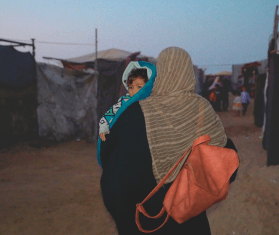The Remain in Mexico policy, officially known as the US Migrant Protection Protocols (MPP), has left more than 1,500 vulnerable asylum seekers waiting in an informal camp at the international bridge between the violent border city of Matamoros, in Mexico’s Tamaulipas state, and Brownsville, Texas. Though latrines and showers have been installed in the camp, Doctors Without Borders/Médecins Sans Frontières (MSF) teams have witnessed the unsanitary conditions in which people are being held and are increasing medical humanitarian activities accordingly. The MPP, initially implemented in January 2019, requires people applying for asylum in the US to wait out their legal proceedings in Mexico.
“We have a team with a doctor, psychologists and social workers who treat issues such as anxiety and post-traumatic stress disorder—consequences of the hopelessness produced by the uncertainty of not knowing what is going to happen with their future or their family,” said Anneli Droste, project coordinator for MSF Mexico's northern border project.
In the last three weeks, MSF has also conducted 178 medical consultations for ailments including diarrhea, hypertension, diabetes, psychiatric conditions, and asthma. Most of the patients exhibited respiratory and skin and soft tissue conditions related to the overcrowded and unsanitary living conditions in the camp. Of these consultations, 48 percent were for women and 52 percent were for men. More than half were under 15 years old (58 percent).
Droste said that she recently spoke with a 15-year-old boy living in the camp with his family while waiting for a decision on their asylum claim. “He told me that they don’t want to be separated from the asylum seekers’ group, because they fear assault or kidnapping,” Droste said. “Staying together is one of the measures they have taken to feel, in some way, protected.”
MSF remains gravely concerned about the humanitarian needs of asylum seekers along Mexico’s northern border and demands, once again, that the Mexican and US governments protect their lives and well-being.




